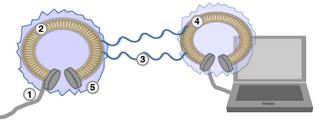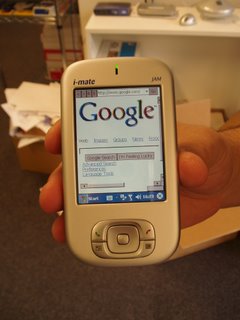Facing serious challenges from new competitors who are grabbing readers and advertising dollars, newspapers must find ways to reinvent themselves to surviveBy Michael Hill, Bultimore Sun
The great department stores once stood in every city like eternal sentinels of American commerce.
In Baltimore, they anchored the corners of Howard and Lexington streets -- Stewart's, the Hecht Co., Hochschild-Kohn, Hutzler's.
And now they are gone.
Some wonder if the same fate awaits the American newspaper.
What was once unthinkable is now thought about as newspaper companies struggle with declining circulation and profits.
Few newspapers have disappeared, but the respected Knight Ridder chain is no more, a victim of pressure from shareholders as circulation and profit margins declined. The Chicago-based Tribune Co., which owns The Sun, has put itself on the block for similar reasons.
No one knows exactly what will come out on the other end of this period of rapid adjustment. But if newspaper owners play their business cards right, most media experts think they will still have institutions that are both profitable and important, in print and online.
But there will certainly be serious challenges. Just as those department stores watched high-end boutiques take one type of customer and low-end discount stores another, newspapers are watching their readers -- and advertisers --- heading in all sorts of directions.
And, just like those old department stores, newspapers are accustomed to providing something for everyone -- not just the news and editorials and columnists, but also sports, stock listings, comics, the crossword, the entertainment reviews and listings, the bridge column, the weather report, obituaries.
Newspapers continue to do this as a matter of course. It is what they are expected to do, just as those department stores had clothes and furniture and toys and housewares and lingerie as well as restaurants and tea rooms.
That's because big-city newspapers have been considered a part of the essential fabric of American urban landscapes, like roads and buildings and schools and parks. They were an assumed ritual of daily life.
That is simply no longer the case.Managers of the Boston Globe, a regional icon in American journalism, recently announced that they expected their newspaper to lose money this year, because of plummeting circulation, classified and advertising revenues.
Media analysts blame that chilling news, in part, on the fact that Boston has more high-speed Internet connections than most cities in America. Editors in other cities see the Globe's problems as a shadow looming in their own futures.
Still, while all acknowledge that the ground is shifting, not all the news is doom and gloom. For now, most newspapers remain highly profitable enterprises.
"Whenever I address an industry group, I always start out by saying, 'You think you've got problems, how would you like to be Ford Motor Company?' " says Peter M. Zollman, a former journalist, now a newspaper industry consultant.
"Or NBC, which has to sit there and watch Tivo take away its entire business model?"
Indeed, newspapers aren't in that much trouble yet. It is the trend lines that many find alarming. The challenge they face at this point is to find ways to compete effectively in a marketplace where there is an array of new competitors offering cheap advertising and free news before revenues begin to plummet.
Newspapers that meet that challenge will survive. Some others will probably die. But that's nothing new in America.
An old story Howard Weaver, the head of news for the McClatchy chain -- which bought Knight Ridder and then sold off about half of its papers -- notes that for most of the history of the United States, newspapers went in and out of business all the time. Major cities might have had a half-dozen papers. Baltimore had The American, The News, The Sun and The Evening Sun.
Weaver points out that newspapers have been hit hard before. It is no accident that their number peaked in the early part of the 20th century, before network radio went on the air. Television's zoom across the landscape after World War II continued the pattern of killing off scores of papers as they lost their monopoly as daily information providers.
Most of those cities that had many papers ended up with only one, maybe two. But those papers were financially strong. Little was required beyond turning on the printing presses to insure a steady profit.
This was the newspaper world of the past four decades, the one that those now in the business grew up in. There was plenty of money for expensive journalistic forays, if the owners were so inclined. Labor strife was common because, as in the other dominant U.S. industries of the day -- such as steel and autos -- there was plenty of money to fight over.
The crucial difference, Weaver says, between newspapers' previous battle and the current onslaught is that newspapers retained one important monopoly -- TV and radio could not do classified advertising.
Sure, automobiles and cereals and cosmetics and other major items could advertise on TV, but if you wanted to sell a car or a house or a wardrobe, you were not about to buy a 30-second spot on your local network affiliate.
Those pages and pages and pages filled with classified advertising provided newspapers with one of their main revenue streams. And it turned out to be something the Internet could do even better.
Consider that almost every one of those listings on eBay, almost every ad on Craigslist and almost every item offered for sale on similar sites all over the Web would have once been a classified ad in a newspaper, and you begin to get an idea of the impact.
"The Internet has made the world vastly different in many ways beyond classifieds," Weaver says. "Our role as the intermediary, the gatekeepers of information, has been eroded. But in terms of the revenue model, that's huge."
That is not to say that classified advertising has disappeared from newspapers. Zollman says it was a $17.2 billion business for newspapers in 2005, down from 2004, but up from 2002 and 2003. But it is way down from the $19 billion it brought in 2000, before the dot.com bubble burst.
There have been other factors in the financial problems of newspapers, but if the Internet could not do classifieds, it is likely pundits would be talking about some challenges facing newspapers, not a full-blown crisis.
Newspaper companies have responded by getting into the online classified business. Three major chains -- Tribune, McClatchy and Gannett -- own Careerbuilders, a major player in the online job search category.
But that raises another as-yet-unanswered question about the future: What business are those chains in? If it turns out that economics favor simply putting the classifieds on the Web without the expense of printing a newspaper, will they jettison the newspapers?
What happened to TVIn many ways, what is happening to newspapers is like the shifting ground that the television networks found themselves on 25 years ago.
The big three networks -- NBC, CBS, ABC -- had America hard-wired. If you wanted to get a message out to the country on TV, you had to go through them. The money rolled in. News divisions were a money-losing luxury to keep the regulators at bay.
Then two things happened. First, satellite communication made it easier for independent producers to bypass the networks and distribute syndicated shows to stations across the country. Oprah Winfrey became wealthy when hundreds of stations bought her show, creating a virtual Oprah network.
Then cable proliferated. There were plenty of ways to get a message out to much more specialized audiences. Which is not to say that the networks were unprofitable; they still had a huge number of eyeballs. But they had to adjust to new financial realities.
News divisions now have to make money. So documentaries don't do what Edward R. Murrow once did -- take on Joe McCarthy or reveal the plight of migrant workers; they tell the stories of salacious murders.
Newspapers lost a similar monopoly. Their distribution system -- delivery to front doors of houses every day -- was once the only way to reach the bulk of people in a city with an advertisement in print.
With the Internet, that is no longer the case. There are all sorts of ways now. There will be an adjustment.
"I am neither an optimist nor a pessimist," says Zollman, whose clients include the Tribune Co. "The newspaper business is changing radically, and journalism is changing pretty radically. But there will still be jobs for journalists. ...
"I think in five or 10 years, newspapers will still be printed, but they will no longer be a mass media; they will be a most effective targeted medium and they will be the largest of the targeted media."
That means newspapers will no longer be a universally accepted piece of the metropolitan landscape, but a product that has an appeal to a certain part of that area. That will be a significant part for sure, but still only a part.
The way to survive that shift, according to Zollman and others, is for newspapers not to make the same mistake another icon of American business did -- railroads, whose leaders thought they were in the railroad business, forgetting they were in the transportation business.
Widget loversSo it is that journalistic enterprises are in the information business, not the newspaper business, something very hard to adjust to.
Weaver says that a business consultant once told him that there was a difference when he worked with newspaper people."When you talk to people who make widgets, those guys want to make a better widget, that's more efficient, that works better," Weaver says the consultant told him. "You guys in newspapers, you're in love with your widget."
And we do love all of that, the smell of the city room, waiting for the first edition to come off the press, going to the bar to talk about it," he says. "We are passionate about those vestiges, but that is not what really matters. What matters is the great story that was in that first edition."
And that is true no matter how that story is delivered, via the newspaper or the Web site or a download to a cellphone or a podcast. The challenge is finding the business model to support that.
Obviously the Web, where advertising revenues are growing, is crucial to that. Zollman says that the successful newspaper Web site "will have very deep local information and lots of contributions from readers, both from within the market and out of the market, people who have something valuable to contribute to the discourse.
"There will be lots of audio and video," he says. "It should not be the mirror image of the newspaper. Newspaper content is a tremendous starting place, but it is only a starting place."
Recognizing that the newspaper audience of the future will be a specialized one means giving up the department-store, something-for-everyone approach.
Zollman says he would keep the comics -- "You can't blow up your entire core audience" -- but, for instance, jettison stock tables as up-to-the-minute prices are available on the Web."
I don't understand why any newspaper in the country, except The Wall Street Journal, runs a single stock price," he says. "I believe at some point newspapers did belong in the business of being all things to all people, but they probably don't have that need any more."
The role of the modern newspaper in the United States has changed pretty substantially," Zollman says. "Some newspapers are successfully changing with it. Many more are struggling to figure out what that new role is."








